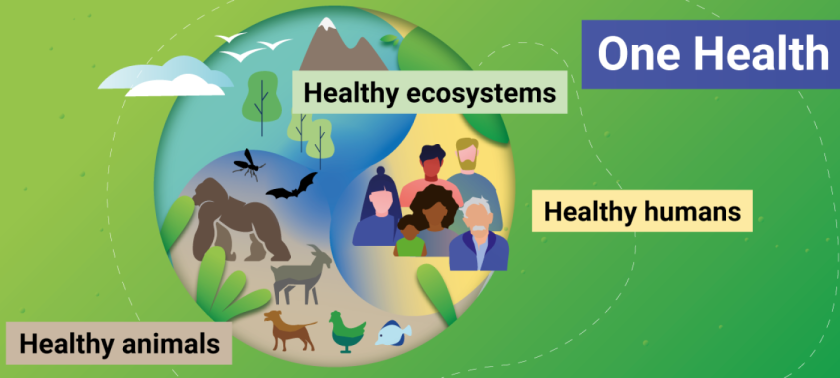
Dr. Arvind Kumar*

The loss of biodiversity can have significant impacts on human health if we do not guarantee that the ecosystem services it provides are protected. Recent diseases such as SARS, avian influenza, Ebola – and the enormous health, economic, and societal impacts of COVID-19 have not yet solicited global unity on the importance of preventing pandemics rather than responding to outbreaks as they emerge. COVID-19 sparked a global health, economic, and societal emergency unlike any other in recent history. It killed more than 6.3 million people as of June 2022, with true mortality being possibly three times higher and numbers continuing to rise. The IMF projected the cumulative output loss from the pandemic through to 2024 to be about $13.8 trillion. Recent studies point out that biodiversity has declined at an alarming rate in the past years, largely as a result of human activity. Most pathogens that are infectious to humans are zoonotic, in other words, they cross over from animals to people. And while many of the benefits of prevention accrue at the national and global levels, the costs tend to be borne locally for interventions such as reducing forest fragmentation and deforestation, monitoring wildlife health, and enhancing the bio-security of livestock farms. What will it take for world leaders, countries, organizations, and communities to understand that prevention is better than cure? Isn’t human activity the main driving force behind new, emerging, and re-emerging diseases?

There is no one-size-fits-all solution and successful implementation will require a set of interventions that speaks to the national and local context. However, if governments make the political choice to follow a One Health approach as part of broader systemic transformations to end the triple planetary crisis of climate change, nature and biodiversity loss, and pollution and waste, we can heal the planet and ourselves. Investing in One Health to Reduce Risks of Emerging Infectious Diseases explores the One Health holistic investment framework that will help governments, international organizations, and donors direct financial resources to prevent pandemics. Biodiversity loss has many consequences, not only for the environment but also for human beings. These consequences span economic disruption to zoological pandemics and human alienation from the natural world. Our current trajectory of habitat alteration and destruction is putting thousands of species in danger of extinction. Land degradation affects soil and water, which are fundamental to food production. Imbalances in ecosystems can lead to the emergence of pests that damage crops. Limit discovery of potential treatments for many diseases and health problems.
From Agreement to Action for Healthy planet and Humans

As we mark the 2023 International Day for Biological Diversity it is worth celebrating the fact that we are, today, better positioned than we have ever been to tackle the global nature crisis – but, as challenging as it was to reach this point, the hardest work still lies ahead. The adoption in December of the ambitious Kunming-Montreal Global Biodiversity Framework – based in large part on the science and evidence provided by IPBES over the last decade – was an absolutely vital element in our shared efforts to address the unprecedented loss of biodiversity and the degradation of nature’s contributions to people. Reversing biodiversity loss and ensuring the longevity of human health and well-being requires collective action and efforts from all segments of society. Important opportunities for reversing biodiversity loss include establishing effectively managed protected and conserved areas and engaging in ecosystem restoration. We did see a major landmark in July, when the UN General Assembly adopted a resolution recognizing the right to a clean, healthy, and sustainable environment. Now we must build on this victory by investing, hard and fast, in One Health. One Health is an effort to integrate human, animal, agricultural and ecosystem health to improve outcomes and address the triple planetary crisis. A One Health approach would help prevent disease, reduce costs, improve food safety and security, and save lives.
Translating global agreements into concrete actions requires transformative change – fundamental shifts in how we value nature, how we interact with it and how we support its intrinsic worth, as well as its invaluable role in supporting human well-being.
Way forward
One Health is an integrated, unifying approach that aims to sustainably balance and optimize the health of people, animals and ecosystems. It recognizes the health of humans, domestic and wild animals, plants, and the wider environment (including ecosystems) are closely linked and inter-dependent. The approach mobilizes multiple sectors, disciplines and communities at varying levels of society to work together to foster well-being and tackle threats to health and ecosystems, while addressing the collective need for clean water, energy and air, safe and nutritious food, taking action on climate change, and contributing to sustainable development. We have to bring attention on the urgent actions needed to keep humans and the planet healthy and foster a movement to create societies focused on well-being. Promoting One Health approaches is an important aspects in this regard.
There is a strong economic case for One Health: the cost of prevention is moderate compared to the cost of managing and responding to pandemics. The World Bank’s global estimate of prevention costs guided by One Health principles ranges from $10.3 billion to $11.5 billion per year, compared to the cost of managing pandemics which, according to the recent estimate by the G20 Joint Finance and Health Taskforce, amounts to about $30.1 billion per year. There has never been a better time to adopt One Health as an investment in humanity’s future. We have to engage governments, multilateral organizations, civil societies and other stakeholders to embed a One Health approach around the world. Nature provides the basis for half the world’s economic activity, yet investment in nature, necessary to sustain these benefits, is insufficient.
Nature must be placed at the centre of the economy through investment decisions that incorporate the risk caused to humanity by biodiversity loss, and increase the investment in nature. On International Day for Biological Diversity – and every day – let us reaffirm our resolve to ‘build back biodiversity’, from agreement to action, for people and the rest of nature. Aren’t we going towards becoming a species in peril, living on a planet in peril? If we act urgently on the triple planetary crisis can’t we can save lives and reduce the burden on healthcare systems? This means de-carbonization. This means backing solutions that work with nature. This means financing adaptation in developing nations. This means a shift to sustainable consumption and production. And most importantly it means a people centric approach by engaging stakeholders, governments, multilaterals and most importantly civil societies towards a rapid shift to One Health.
*President, India Water Foundation



